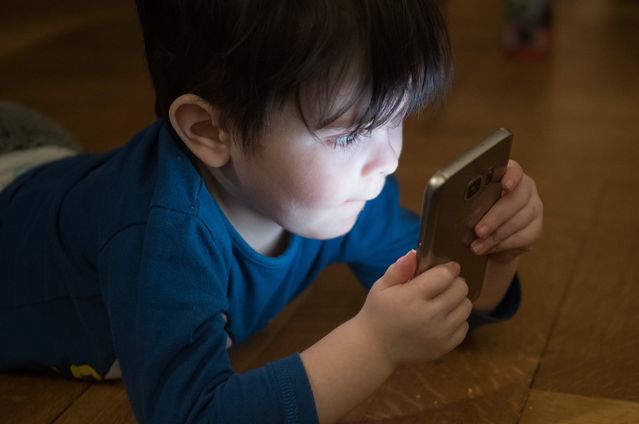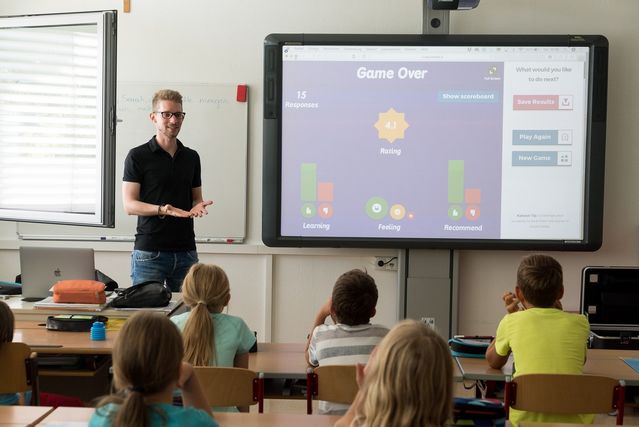Internet Addiction
How Do You Know If Your Child Gets Too Much Screen Time?
Should you let children play more video games during the coronavirus quarantine?
Posted March 17, 2020

There is widespread concern that children are getting far too much screen time. Overuse of screens is one of the major health concerns of parents in many of the industrialized, technological countries in the world. These concerns are shared by mental health professionals and have resulted in a new diagnosis, Internet Gaming Disorder, that is included in the latest version of the Diagnostic and Statistical Manual (DSM-V), the American Psychiatric Association codebook for clinical diagnosis.
Internet Gaming Disorder is listed as a “Condition for Further Study,” meaning that it is not an "official" disorder in the DSM-V but included to promote further attention and research. While there is significant controversy about this diagnosis and Internet Gaming Disorder is actually quite rare in children, problematic screen time is increasingly common. Recent studies from Common Sense Media and the Pew Research Center indicate that teens are on screens about 9.5 hours per day, leaving little time for anything else. But does this mean that the vast majority of kids and teens are addicted to screens? What is clear to many teens and adults is that their screens are taking too much of their time and energy. So how can we identify the signs of when kids are too involved with screen time? And should you allow your children to play more video games during the coronavirus quarantine?
Consider basic parenting strategies during the coronavirus quarantine. First, protect your children's physical health. Keep them away from crowds, have them wash their hands, cough into their arms, and be mindful of older people who may be more susceptible to the coronavirus. Second, consider their mental health. For many kids, the coronavirus is scary and the impact is more about anxiety, stress, and uncertainty than it is about getting sick. Keep them away from frightening news about the coronavirus. Maybe even shut off the TV except for movies, cartoons, and fun shows. See if you can help them develop a new hobby or interest that engages them. Keep them physically active, if possible outdoors. The evidence is overwhelming, exercise and nature reduce anxiety and stress. And allow them to do things that they love and that keeps their mind off the stress and uncertainty of the next weeks—let them play more video games.
How much more may be the most difficult question. To the degree that it helps your kids relax, have fun with their friends (most gaming can be done online, remotely, as suggested during the coronavirus pandemic), and take their mind off worries, it will be helpful. Parents will want to consider other factors as well in structuring their kid's access to gaming and other screen-based activities. In these extraordinary times, relaxing some of your rules makes sense, but you'll want to be careful that your kids are not overdoing their video gaming. If you get to the point where you believe it is excessive, learn a bit more about the characteristics of gaming addictions.
One way would be to look at the signs of Internet Gaming Disorder, a “Condition for Further Study” in the newest version of the Diagnostic and Statistical Manual (DSM-V) of the American Psychiatric Association.
According to the American Psychiatric Association, the symptoms and conditions for a diagnosis of Internet Gaming Disorder include:
- Preoccupation with gaming
- Withdrawal symptoms when gaming is taken away or not possible (sadness, anxiety, irritability)
- Tolerance, the need to spend more time gaming to satisfy the urge
- Inability to reduce playing, unsuccessful attempts to quit gaming
- Giving up other activities, loss of interest in previously enjoyed activities due to gaming
- Continuing to game despite problems
- Deceiving family members or others about the amount of time spent on gaming
- The use of gaming to relieve negative moods, such as guilt or hopelessness
- Taking risks, or having jeopardized or lost a job or relationship due to gaming
Gaming must cause "significant impairment or distress" in several aspects of a person's life. This proposed condition is limited to gaming and does not include problems with general use of the Internet, online gambling, or use of social media or smartphones.
Under the proposed criteria, a diagnosis of Internet Gaming Disorder would require experiencing five or more of these symptoms within a year. The condition can include gaming on the internet or on any electronic device, although most people who develop clinically significant gaming problems play primarily on the internet.
As I have reported previously, these criteria are not a great fit for younger children due to developmental considerations and the need to collect many of the symptoms via self-report (rather than others). Nonetheless, they can be helpful for identifying the signs of when kids are too involved with screen time.
Using the DSM-V Internet Gaming Disorder as a starting place, I suggest the following criteria to help determine if children are displaying excessive screen time — with two crucial caveats:
- Developmental factors are important in recognizing excessive screen time: Younger kids need time for many other activities, and teenagers rely on their screens for a myriad of academic, social, and recreational needs.
- Family sensibilities often define what is excessive screen time. In this case, I am not talking about situations where parents do not provide any oversight, but instead where families see great value in surfing the internet, texting friends, playing video games, and viewing television and movies as worthwhile educational and recreational activities.
Preoccupation with gaming — While preoccupations come and go for younger children, pre-teens and teens may want to revolve their lives around gameplay. It might be the only topic they want to talk about with their friends and, when preoccupied enough, with their parents and other adults. Optional assignments at school, their drawings, and the books they read are focused on games of interest, and they struggle with having a good time while involved in other activities.
Withdrawal — Children display noticeable changes in mood when they are away from their games for a substantial period of time and struggle to have fun in any activity that does not include gameplay. Signs of excitement and positive affect occur primarily when gaming.
Tolerance — Kids want to play more and more, almost as if they are avoiding other activities. Increasing interest goes beyond getting better at the game and the resulting self-esteem from their expertise.
Inability to reduce playing — Children want to keep playing and see nothing wrong in doing so. Parents DO have control over internet access and gaming for their children and need to make decisions about gaming time. Addictive gaming behavior can be observed in kids who insist on playing at the first available opportunity and have had gaming sessions that last seven or more hours nonstop. Many kids need boundaries and limits set for them, particularly those with mental health and learning issues. Consider that the desire to do something fun that provides personal improvement and positive feedback from peers may be a rare experience for many special needs kids and that, as a result, they may not want to reduce their gameplay.
Giving up other activities — Kids’ interests change over time. Children who loved playing soccer at the age of 7 may no longer enjoy the game. Those who have a busy schedule may prefer to sit at home and play video games rather than go to Scouts, take karate lessons, or play an instrument. Problematic gaming occurs when children refuse to engage in many other previously preferred activities, with the sole intention of playing video games instead.
Continue to game and to deceive others — I am combining these two criteria for kids because parents have some control over how much their kids play video games. But many kids sneak video-game play and lie or minimize their gameplay because it results in disapproval from their parents. When this behavior has not been present in the child’s past, there is cause for concern about problematic gaming.
Gaming to reduce negative mood — Teens commonly cite this as a reason for playing video games. Screen time as a stress management tool is not problematic if it is not accompanied by many of the above symptoms. Sitting down after a long day at school and watching a television show, reading an eBook, or having an extended phone call with a friend are all considered healthy uses of technology that reduce stress. As long as your child is having fun, it’s probably a healthy activity.
Jeopardizing relationships and/or school performance — When an “A” student becomes a “D” student because of gaming, there is a problem. It’s normal that children would rather play video games than do their homework or choose to rush through their work because they get caught up in their gameplay. However, it’s time to set stricter limits when children choose to isolate themselves from friends on an ongoing basis because of video-game play.
Psychologists are observing increasing numbers of children who are overly engaged with their screens and technology. Most of these kids are not addicted to their screens but display signs of problematic gaming behavior: staying up late to play games; being tired when they go to school; playing games before homework is completed; preferring to play video games by themselves; having few friends outside of the gaming world; experiencing a drop in grades; and having less engagement in other activities, formal clubs, and personal hygiene. Parents often report behavioral repercussions of gameplay such as irritability, anger, defensiveness about gaming habits, and anxiety when not playing a game. Physical concerns due to excessive gaming can include missing meals, getting headaches, or having finger or wrist pain. While these behaviors do not constitute an Internet Gaming Disorder, they do require action on the part of parents and professionals.

Identifying problematic or excessive video game and screen-time use is crucial in helping many of these kids. Early identification and more parental control over technology use can reduce problematic gameplay and may be appropriate for kids with ADHD, Autism Spectrum Disorder, learning disabilities, anxiety, and depression. These kids may require strict schedules and limits on gameplay, along with curating game and technology use, as some genres (e.g., MMOs and role-playing games) are more addictive in nature. Leveraging gameplay into learning time can also be part of a plan that encourages productive use of screen time. Families may need counseling in behavioral management techniques and limit-setting strategies. Time and energy will be crucial to developing interests beyond gaming.
Addiction (in this case Internet Gaming Disorder) is a very serious psychiatric disorder that requires assessment by an addiction expert and intensive treatment. While video game rehab is being touted for kids who overdo gameplay, I caution parents to examine the pros and cons of this form of treatment carefully. Start early with a clinician who has expertise in child development and family therapy. If problematic gaming persists, seek an expert in this area or find clinicians who have familiarity with addictive behavior.
During coronavirus quarantine, we might want to relax our concerns about kids who are relying upon gaming as an escape. Yet we need to remain vigilant when it is clear that kids are overdoing it and showing clinical signs of addictive behavior. If that becomes the case consider some of the strategies described, look into effective parental controls, and find other ways to reduce the stress that your kids are experiencing.




